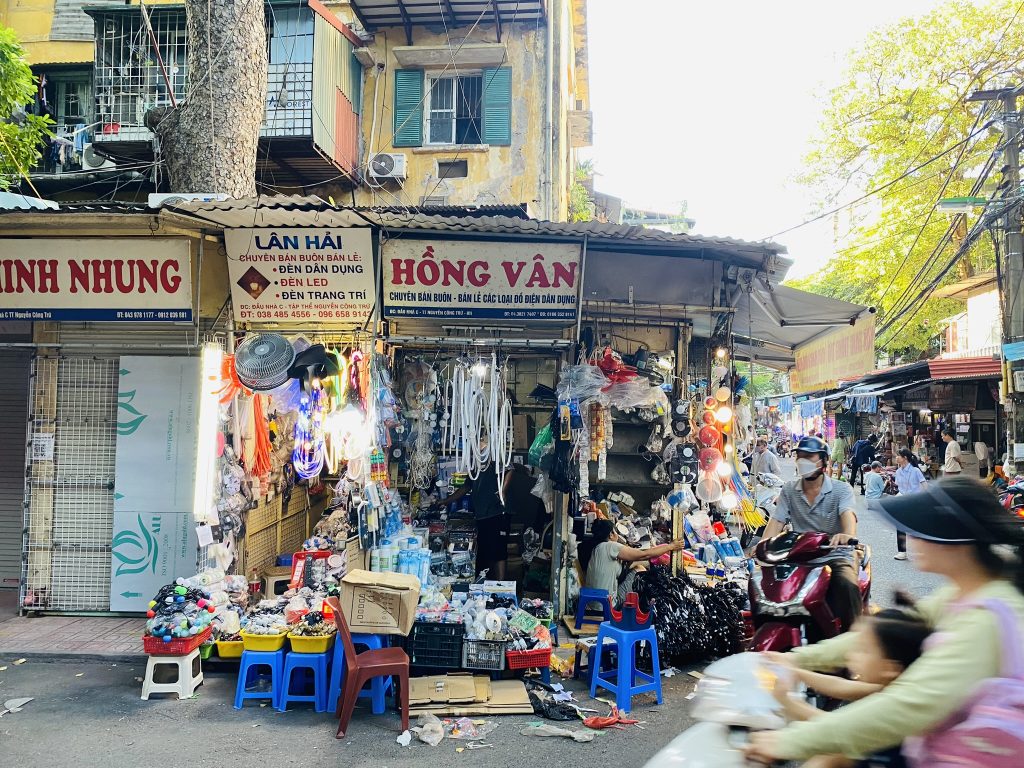Cho Gioi, or Gioi Market, is the colloquial name for Hoa Binh Market in Hanoi. It is situated 2.5 km away from Hoan Kiem Lake and 3.5 km away from Hanoi Old Quarter. This market sells all kinds of goods, ranging from small items such as nails and watch batteries to larger products such as motorbikes, electronics, and refrigerators.
>>> Check out: A Free & Self-guided Hanoi French Quarter Tour 2023

According to some documents, Gioi market was formed around 1954-1955, when people displaced (evacuated) to the South needed to sell their used property during the Vietnam War. The name “Gioi market” has existed since the subsidy period (1965-1986), when the demand for non-orthodox goods exchange led to spontaneous markets meeting outside, different from covered markets such as Dong Xuan market, Hom market, Hang Da market, etc., for those with business registration. Goods exchanged at the market have all kinds of origins, including hand-carried goods from abroad, privately produced goods without labels, and many second-hand, fake, and stolen goods.
>>> Check out: Stories from Vietnam War at not-to-go-alone areas

At one point, the government tried to close the market and even moved Gioi market to Phung Hung street. However, these efforts were unsuccessful because the need for exchange really existed and the market area was already a familiar place, not easy to change. Since the country opened up and renewed, many professional shops have appeared, selling goods with labels. However, small exchanges are still carried out in the “Gioi market”.

Market Areas
Thinh Yen Street (formerly known as Rue Dumoutier during the French colonial period) serves as one of the gateways to the market, where a variety of music discs (CDs, VCDs, DVDs) are sold. Additionally, old and new electronic products such as televisions, amplifiers, and music players are also very popular in this area.
>>> Check out: Stories from Vietnam War at not-to-go-alone areas on Airbnb Experience

Located next to the entrance of the King Pagoda is a place where electronic components and computer items are sold. The area at the end of the market is known for selling all kinds of goods, including items that might be considered discarded.



Condominiums in Hanoi
The condominiums in Hanoi are adored for their community feel and photogenic qualities. They hold deep and special memories for the people of Hanoi and are considered one of the city’s most iconic symbols, with their crumbling ochre yellow walls and concrete greys.


There are many interesting and unusual stories about the condominiums in Hanoi, from the reasons behind their creation to the principles and architectural styles that shaped their development. From 1958 to 1990, the khu tập thể complexes covered over 4,000 square meters of Hanoi’s urban area. The Nguyen Cong Tru area is one of the very first condominiums in the city. If you have a chance, try visiting one of the old buildings around the city to experience how Vietnamese people lived in the past.
→ Watch: I discovered Soviet heritage… in Hanoi, Vietnam


Many buildings that exist today have a rich history and cultural significance. Even though they may appear old and worn, they possess a unique charm and character that cannot be replicated by modern buildings. In fact, when these structures stand next to newer buildings, they create a fascinating contrast that highlights the evolution of architecture and design over time. By preserving these buildings, we are not only honoring our past but also providing future generations with a tangible link to the rich history of our cities and communities.
>>> Check out: Discovering The REAL Hanoi With A Local (and the cheapest beer in the WORLD!)

There is a local bia hoi shop run by a veteran who is 81 years old but still very healthy. He opened the beer shop and never raised the price. It is just 8.000 VND for a glass of beer. He aims to welcome other veterans to enjoy the beer. He lives with his family, and when he is busy, his wife and son help him serve the guests.


Facts:
- Some people believe that if something is stolen in Hanoi (e.g. motorcycle parts, auto parts, electrical or household appliances), it is likely to end up in Gioi market. In the past, people also bought and sold license plates for cars and motorbikes in this market, but the police were able to stop them.
- Gioi market, also known as Hoa Binh market, is a flea market in Hanoi that was established in 1954. It specializes in selling stolen goods, imitation goods, and famous second-hand goods from the capital. The market operates under the roadway of many streets such as Tran Cao Van, Yen Bai, Thinh Yen, and King Pagoda, with roughly 700 business households. At the end of 2012, the local Gov’ district proposed moving Gioi market due to environmental pollution and traffic obstruction.

We are very happy to host Elina, one of the best YouTubers from Russia with over 500,000 subscribers to discover the hidden part of Hanoi. We are thrilled to share the stories of Hanoi and Vietnam with the world.
Cho Gioi is an interesting part of Hanoi that is often unknown to travelers, but it has a rich history to share. Join our not-to-go-alone area to discover one of the most fascinating parts of Hanoi. We are top local experts on Airbnb!



